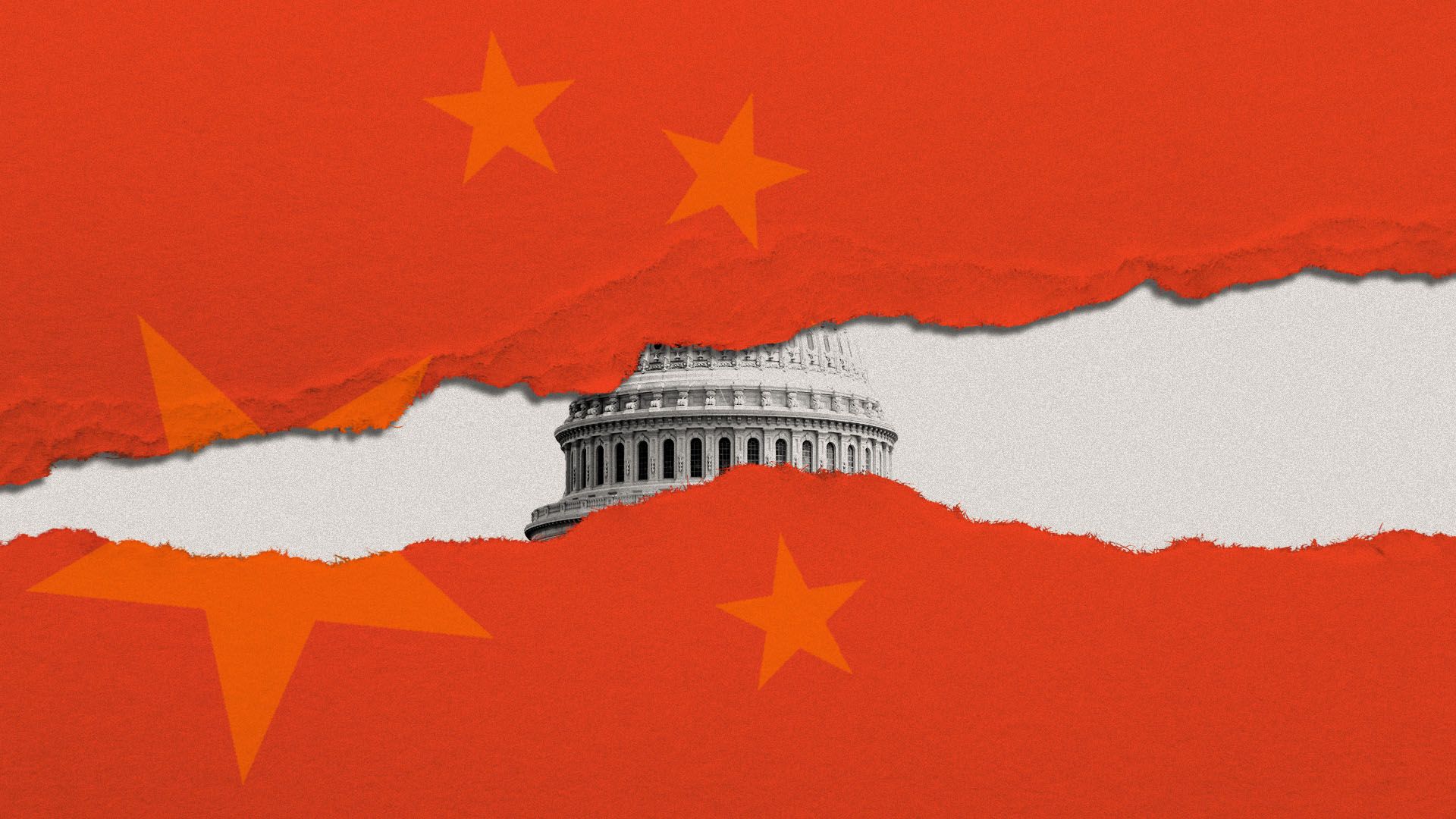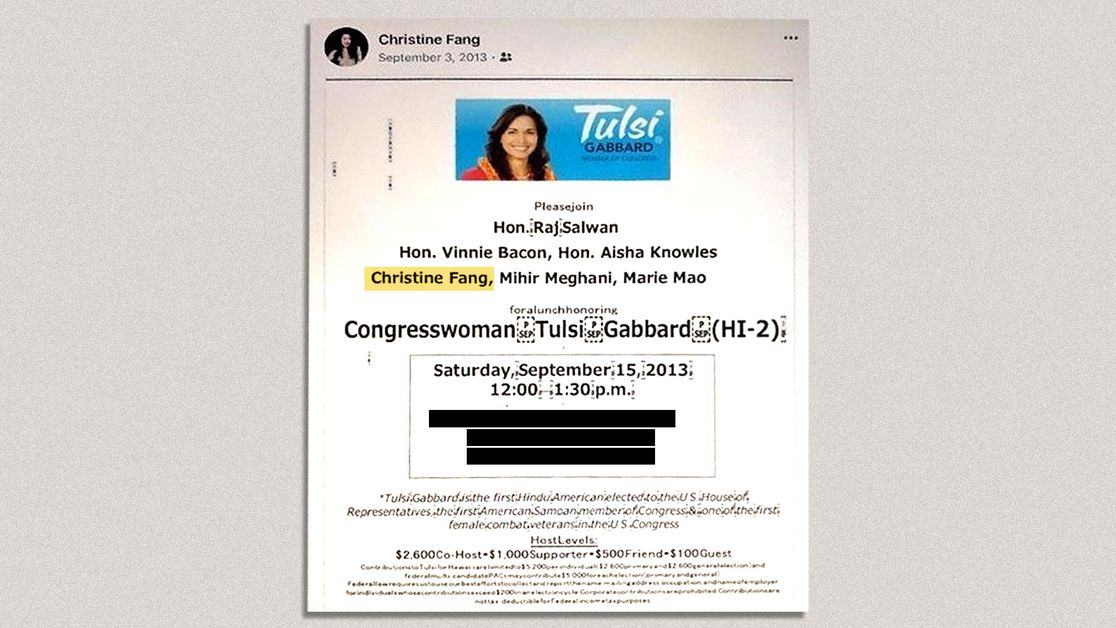| | | | | | | Presented By UnitedHealth Group | | | | Axios Investigates | | By Mike Allen ·Dec 08, 2020 | | Welcome to a special edition of Axios AM. - Axios' Bethany Allen-Ebrahimian, who covers China, and Zach Dorfman of the Aspen Institute, who covers national security and writes Axios Codebook, spent a year investigating this profoundly important story about one of Beijing's efforts to gather intelligence and influence U.S. politics.
Go deeper: Smart Brevity™ count: 1,954 words, or 7 minutes. | | | | | | 1 big investigation: Suspected Chinese spy targeted California politicians |  | | | Illustration: Sarah Grillo/Axios | | | | A suspected Chinese intelligence operative developed extensive ties with local and national politicians, including a U.S. congressman, in what U.S. officials believe was a political intelligence operation run by China's main civilian spy agency between 2011 and 2015, Axios found in a yearlong investigation. Why it matters: The alleged operation offers a rare window into how Beijing has tried to gain access to and influence U.S. political circles. - While this suspected operative's activities appear to have ended during the Obama administration, concerns about Beijing's influence operations have spanned President Trump's time in office and will continue to be a core focus for U.S. counterintelligence during the Biden administration.
Clockwise from top left: Fang with then-Dublin City Councilmember Eric Swalwell at an October 2012 student event; undated photo of Fang, now former Fremont Mayor Bill Harrison and Rep. Judy Chu; Fang with then-Rep. Mike Honda and then-San Jose city Councilmember Ash Kalra at a March 2014 event at the Chinese Embassy in D.C. Sources: Renren, Facebook, Facebook The woman at the center of the operation, a Chinese national named Fang Fang or Christine Fang, targeted up-and-coming local politicians in the Bay Area and across the country who had the potential to make it big on the national stage. - Through campaign fundraising, extensive networking, personal charisma, and romantic or sexual relationships with at least two Midwestern mayors, Fang was able to gain proximity to political power, according to current and former U.S. intelligence officials and one former elected official.
- Even though U.S. officials do not believe Fang received or passed on classified information, the case "was a big deal, because there were some really, really sensitive people that were caught up" in the intelligence network, a current senior U.S. intelligence official said.
- Private but unclassified information about government officials — such as their habits, preferences, schedules, social networks, and even rumors about them — is a form of political intelligence. Collecting such information is a key part of what foreign intelligence agencies do.
Among the most significant targets of Fang's efforts was Rep. Eric Swalwell (D-Calif.). - Fang took part in fundraising activity for Swalwell's 2014 re-election campaign, according to a Bay Area political operative and a current U.S. intelligence official. Swalwell's office was directly aware of these activities on its behalf, the political operative said. That same political operative, who witnessed Fang fundraising on Swalwell's behalf, found no evidence of illegal contributions.
- FEC records don't indicate Fang herself made donations, which are prohibited from foreign nationals.
- Fang helped place at least one intern in Swalwell's office, according to those same two people, and interacted with Swalwell at multiple events over the course of several years.
A statement from Swalwell's office provided to Axios said: "Rep. Swalwell, long ago, provided information about this person — whom he met more than eight years ago, and whom he hasn't seen in nearly six years — to the FBI. To protect information that might be classified, he will not participate in your story." What happened: Amid a widening counterintelligence probe, federal investigators became so alarmed by Fang's behavior and activities that around 2015 they alerted Swalwell to their concerns — giving him what is known as a defensive briefing. - Swalwell immediately cut off all ties to Fang, according to a current U.S. intelligence official, and he has not been accused of any wrongdoing.
- Fang left the country unexpectedly in mid-2015 amid the investigation. She did not respond to multiple attempts by Axios to reach her by email and Facebook.
Between the lines: The case demonstrates China's strategy of cultivating relationships that may take years or even decades to bear fruit. The Chinese Communist Party knows that today's mayors and city councilmembers are tomorrow's governors and members of Congress. - In the years since the Fang probe, the FBI has prioritized investigations into Chinese influence operations, creating a unit in May 2019 within the bureau solely dedicated to countering Beijing's activities at the state and local levels. U.S. national security officials believe the threat posed by China has only grown with time.
- "She was just one of lots of agents," said a current senior U.S. intelligence official.
- Beijing "is engaged in a highly sophisticated malign foreign influence campaign," FBI director Chris Wray said in a July 2020 speech. These efforts involve "subversive, undeclared, criminal, or coercive attempts to sway our government's policies, distort our country's public discourse, and undermine confidence in our democratic processes and values," Wray said.
The FBI declined to comment. The Chinese Embassy in Washington did not respond to a request for comment. Details: Axios spoke with four current and former U.S. intelligence officials about the case over a period of more than a year. They requested anonymity because they were not authorized to speak to the media about the case. - Axios also spoke with 22 current and former elected officials, political operatives, and former students who knew Fang personally when she was based in the United States.
|     | | | | | | 2. The cover: How Fang worked |  | | | Illustration: Sarah Grillo/Axios | | | | Fang's friends and acquaintances said she was in her late 20s or early 30s when she was based in the U.S. and was enrolled as a student at a Bay Area university. She used political gatherings, civic society conferences, campaign rallies, and campus events to connect with elected officials and other prominent figures, according to U.S. intelligence officials, Bay Area political operatives, former students, and current and former elected officials who knew her. - U.S. intelligence officials believed she was overseeing likely unwitting subagents whom she helped place in local political and congressional offices.
- Fang attended regional conferences for U.S. mayors, which allowed her to grow her network of politicians across the country.
- She also engaged in sexual or romantic relationships with at least two mayors of Midwestern cities over a period of about three years, according to one U.S. intelligence official and one former elected official.
- At least two separate sexual interactions with elected officials, including one of these Midwestern mayors, were caught on FBI electronic surveillance of Fang, according to two intelligence officials. Axios was unable to identify or speak to the elected officials.
Between 2011 and 2015, Fang's activities brought her into contact with many of the Bay Area's most prominent politicos. - She volunteered for Ro Khanna's unsuccessful 2014 House bid, according to a former campus organizer and social media posts. (Khanna, a Democrat, was elected to the House in 2016.) Khanna's office said he remembers seeing Fang at several Indian American political gatherings but did not have further contact with her. Khanna's office said the FBI did not brief him on her activities. Khanna's 2014 campaign staff said that Fang's name does not appear in their staff records, though they said that their records do not include all volunteers.
Flyer for fundraiser for Rep. Tulsi Gabbard. Source: Facebook - Fang helped with a fundraiser for Rep. Tulsi Gabbard (D-Hawaii) in 2013, according to a flyer from the event Fang shared on Facebook. She appeared in photos over multiple years with a host of California politicians, including Khanna, Swalwell, Rep. Judy Chu (D-Calif.) and then-Rep. Mike Honda (D-Calif.).
- Gabbard "has no recollection of ever meeting or talking with her, nor any recollection of her playing a major role at the fundraiser," a spokesperson said in an email to Axios.
- Fremont City Councilmember Raj Salwan, whose name appears on the flyer, told Axios he was unaware of Fang's role in the event and her name was added to the flyer by other Asian American leaders.
- Chu's office said they have no records of Christine Fang. Honda said he had no memory of meeting Fang.
 From left: Fang with Fremont City Councilmember Raj Salwan (L) and then-U.S. House candidate Ro Khanna at a September 2013 fundraiser for Rep. Tulsi Gabbard; Fang helped organize a 2012 town hall for Rep. Judy Chu. Sources: Facebook The bottom line: U.S. officials believe Fang's real reason for being in the U.S was to gather political intelligence and to influence rising U.S. officials on China-related issues. |     | | | | | | 3. Sounding the alarm: The U.S. response |  | | | Illustration: Sarah Grillo/Axios | | | | U.S. counterintelligence officials said they believe Fang acted at the direction of China's Ministry of State Security (MSS), the country's main civilian spy agency. - U.S. officials first noticed Fang through surveillance they were conducting on a different person — a suspected MSS officer working undercover as a diplomat in the San Francisco consulate, a current U.S. counterintelligence official said.
- The suspected officer used the consulate as a base to do outreach to state and local-level U.S. politicians, including inviting them on trips to China, the official said.
- The official added that both Fang and the suspected officer were focused on gathering political intelligence and conducting influence operations in the Bay Area. (Axios corroborated through U.S. State Department records that a Chinese diplomat with the same name as the suspected MSS officer was stationed in San Francisco during the period Fang was there.)
- Fang and the suspected officer met or spoke on numerous occasions, leading U.S. officials to look into Fang's own background and activities, the official said.
- However, Fang's main intelligence handlers were believed to be based in China, according to two U.S. officials.
Fang was put under FBI surveillance, four current and former U.S. officials said. The FBI's San Francisco Division led a counterintelligence investigation into Fang's activities, according to one current and one former U.S. intelligence official. - "The fact that she was traveling around the country" getting close to U.S. politicians "was a big red flag," said one of the officials. "She was on a mission."
What happened next: Senior U.S. intelligence officials provided multiple defensive briefings around 2015 to warn targeted local and national politicians about Fang's connections to Chinese intelligence and potential Chinese assets in their offices, one of these officials said. - U.S. intelligence officials also provided multiple briefings to White House officials and members of Congress on the case, a current senior official said.
|     | | | | | | A message from UnitedHealth Group | | Helping people afford prescription drugs | | |  | | | Optum is helping people afford prescription drugs by estimating cost and approval information when a medication is being prescribed:- 400,000 providers use the tool
- 9 million people have benefited
- People save $225 per prescription
Learn about OptumRx's PreCheck MyScript. | | | | | | 4. How it ended: Fang left the U.S. suddenly |  | | | Illustration: Sarah Grillo/Axios | | | | U.S. officials said China's intelligence operation broke up in mid-2015 when Fang left the U.S. amid the FBI-led probe. - Fang had planned to travel to Washington, D.C., to attend a June 2015 event.
- But shortly beforehand, she said she could no longer attend because she unexpectedly needed to return to China, according to an acquaintance from California on the same trip, who spoke with Axios.
Many of Fang's political contacts in the Bay Area were surprised and confused about her sudden departure from the country. - "When she left kind of abruptly, we all kind of scratched our heads," recalled Harrison, the former Fremont mayor. (The FBI reached out to Harrison after Fang's departure.)
- "She disappeared off the face of everything," remembered Gilbert Wong, the former mayor of Cupertino, Calif., who had seen Fang frequently at political events.
Fang has not returned to the U.S., said intelligence officials and her former political acquaintances. She appears to have largely cut off contact with her U.S.-based friends and the networks she spent years building in California. The Justice Department has filed no public charges against Fang. |     | | | | | | 5. Why Beijing targets California's Bay Area |  Data: FEC; Map: Andrew Witherspoon/Axios The Bay Area offers ideal conditions for a foreign intelligence operative aiming to identify and target ambitious local politicians with national aspirations. The big picture: Some of America's most powerful politicians got their start in Bay Area politics, and China recognizes California's importance. The MSS has a unit dedicated solely to political intelligence and influence operations in California. - Silicon Valley is also the world's most important center for the technology industry, making it a hotbed for Chinese economic espionage. Russian intelligence has also long targeted the Bay Area.
Democrats dominate the Bay Area, from mayors to its numerous U.S. congressional districts, and anyone seeking proximity to power needs to be in their political circles. What's at stake: Chinese Americans find themselves in a difficult position in 2020, being squeezed both by influence campaigns from the Chinese government and a rise in anti-Chinese racism in the United States. - Khanna said in a statement: "I respect the need for law enforcement to protect our nation from espionage. [But] we need strict guardrails to make sure the FBI's investigations do not have collateral damage to the privacy of American citizens or to the legitimacy of Asian Americans in this country."
|     | | | | | | 6. The bottom line |  | | | Illustration: Sarah Grillo/Axios | | | | U.S. intelligence officials believe China's spy services have become more aggressive and emboldened, including in their U.S.-focused influence and political intelligence-gathering operations. - Fang's case shows how a single determined individual, allegedly working for Beijing, can gain access to sensitive U.S. political circles.
|     | | | | | | A message from UnitedHealth Group | | How to make health care more affordable | | |  | | | | Transitioning to value-based arrangements for prescription drugs will lower consumer out-of-pocket costs by 28%, improve outcomes, and speed access to new curative therapies. Learn more about UnitedHealth Group's ideas to make health care more affordable. | | | | | | Axios thanks our partners for supporting our newsletters.
Sponsorship has no influence on editorial content. Axios, 3100 Clarendon Blvd, Suite 1300, Arlington VA 22201 | | | You received this email because you signed up for newsletters from Axios.
Change your preferences or unsubscribe here. | | | Was this email forwarded to you?
Sign up now to get Axios in your inbox. | | | | Follow Axios on social media:    | | | | | |












No comments:
Post a Comment